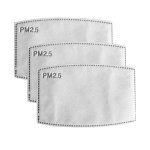The term "face mask" includes cloth masks, plus single-use face masks (commonly called surgical or medical masks), and N95/P2 respirator face masks. All of them, manufactured properly, are suitable for use to prevent the spread of Coronavirus (COVID-19). We strongly recommend you buy Australia Made face masks so as to ensure an effective, quality product.
Fabric or Cloth Face Masks
Fabric or Cloth face masks are any nose and mouth covering made of washable fabric. It's recommended a cloth mask made of three layers of a mix of breathable fabrics to ensure adequate protection. It does not need to be surgical quality to be effective.
You can even Make Your Own Cloth Mask.
Fabric/Cloth Face Mask are reuseable and should be washed after each use. See How to Wash Cloth Face Coverings.
We have available the Australian Made range of Sharkskin Envirus advanced technology fabric, antimicrobial face masks. (See below.)
Surgical or Medical Level 2 and Level 3 Facemasks
Surgical or Medical masks are made with a non-woven melt-blown polypropylene layer and available in various levels of protection. These are single-use, disposable masks only so can't be washed and used again.
Medical or Surgical Face Masks should be manufactured to Level 1, 2 or 3 according to the Australian Standards. Revised in December 2015 the standard AS 4381:2015 for Face Masks are now performance-based on 3 tests:
- Bacterial Filtration Efficiency (BFE) with Differential Pressure (Delta P) & Synthetic Blood Penetration Resistance. Fluid resistance is measured mm Hg, masks are rated according to performance.
- L1-80 mm Hg. L2-120 mm Hg. L3-160 mm Hg.
- Fluid Resistance: The ability of the mask to limit the passage of blood or body fluids from the outer facing through the mask layers to the inner facing.
Level 1. Applications: For general purpose medical procedures, where the wearer is not at risk of blood or body fluid splash or to protect staff and/or the patient from droplet exposure to microorganisms (e.g. patient with upper respiratory tract infection visits General Practitioner).
Level 2. Applications: For use in emergency departments, dentistry, changing dressings on small wounds or healing wounds where minimal blood droplet exposure may possibly occur (e.g. endoscopy procedures).
Level 3. Applications: For all surgical procedures, major trauma first aid or in any area where the health care worker is at risk of blood or body fluid splash (e.g. orthopaedic, cardiovascular procedures).
In general surgical/medical face masks are way more comfortable than the N95 respirator style face masks. However, because these surgical masks are in short supply for medical professionals and emergency service providers, the government is suggesting you use a non-medical fabric face mask.
P2 or N95 Respirator Face Masks
A P2 mask, also known as a P2/N95 mask or P2/N95 respirator, is a disposable face mask that is specially designed to filter the air and block particles above a certain size, including smoke and fine dust. The only difference between P2 and N95 is the region of classification and its testing requirements — P2 is European and N95 is the USA equivalent.
P2 or N95 respirator face masks are not recommended for use in the community and not advised to be used outside of healthcare or specific industries under health advice. We should prioritise the use of N95 respirators for those personnel at the highest risk of contracting or experiencing complications of infection.



